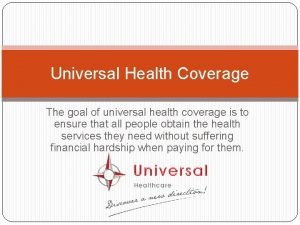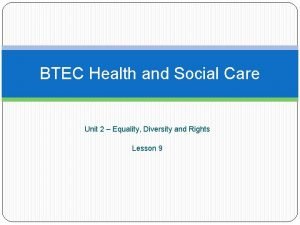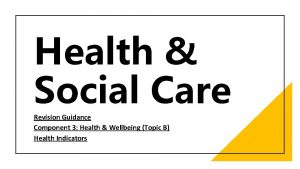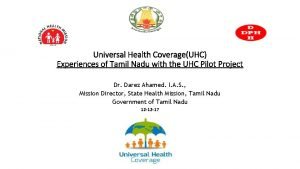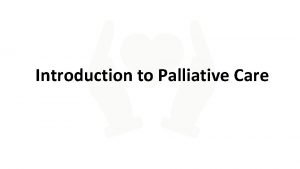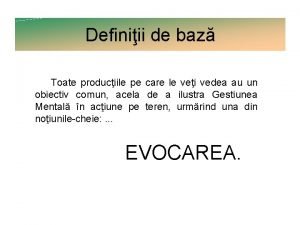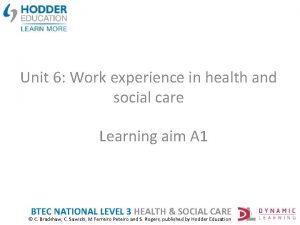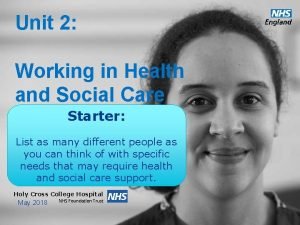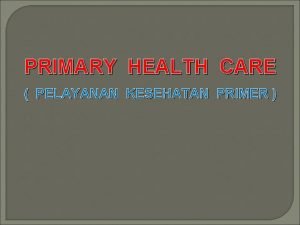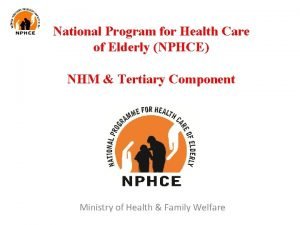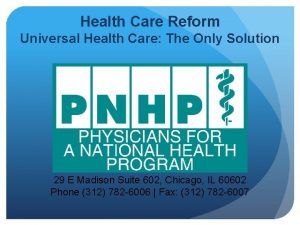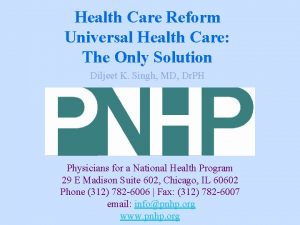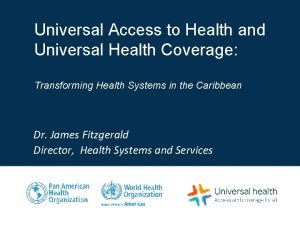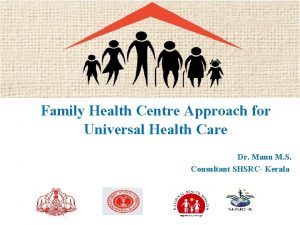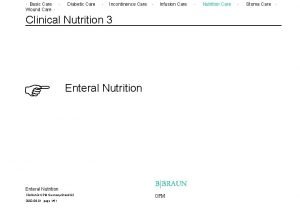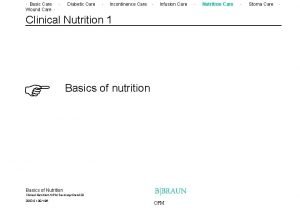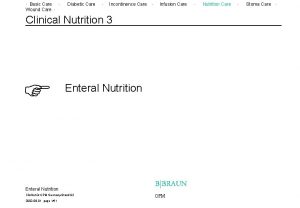Universal Health Care ACADEMIC SESSION 20112012 9 th







































- Slides: 39

Universal Health Care ACADEMIC SESSION 2011/2012 9 th May 2012 ( MB; BS - YEAR 1 - SEMESTER – 2 ) Dr. P Y Lee

Universal Health Care General: • the role of governments • provision of healthcare, education, defense, transport etc • healthcare is a human right expected by the citizens of a nation • provision of basic healthcare is not uniform among nations • developed nations and developing nations provide different levels of healthcare • WHO recommendation is to allocate 5% of GDP to the health sector

Universal Health Care The Fundamental Issues: • is the provision of health care adequate (coverage) • is the provision of care of an acceptable standard of efficiency and quality • is healthcare accessible to all • is healthcare affordable The Common Problems: • the escalating cost • no evidence to indicate that the cost could be reduced in the foreseeable future • funding – the government, the people or by both parties, and the methods of funding

Definition - Universal Health Care (1) Universal health care is the belief that all citizens should have access to affordable high-quality medical care. (2) Universal health care is a term referring to organised health care systems build around the principle of universal coverage for all members of society, combining mechanisms for health financing and service provision. (3) A health economic programme in many countries (other than the United States) that is financed by taxes and administered by the government to provide comprehensive health care that is accessible to all citizens of that nation

Definition - Universal Health Care (4) Universal health care means that every individual has basic coverage for medical, dental and mental health needs. Providing this coverage will mean reforms that will provide medical services at a cost within the means of the average citizen.

Universal Healthcare, Single Payer System and Socialized Medicine What is the difference…… Universal healthcare: • means everyone has coverage to pay for access to healthcare • does not mean that only the government pays for that access • it is usually a combination of public and private coverage • in most cases the providers and facilities are mostly privately own services • some experts may even say that some form of universal healthcare already exists in US today

Universal Healthcare, Single Payer System and Socialized Medicine Single Payer System: What it entails: • usually refers to “national healthcare” – in UK the NHS • means everyone gets coverage (has health insurance) • government collects almost all of the revenue and pays almost all the bills for the healthcare system Examples are: Australia, Canada, Sweden and UK • here the government finances health care but is not involved in the delivery of care • providers and facilities are mostly private services • though some may be run by the government • fits the broad definition of socialized medicine but distinctly a different system

Universal Healthcare, Single Payer System and Socialized Medicine Single Payer System: basically addresses the funding mechanism • “Payer” effectively refers to “the administration” • financed by a single public body • usually by the government • from a single fund and in some cases from a mixed fund – public and private • limits access to health care by using “waiting less for surgery and for diagnostic procedures” • and by postponing / canceling surgeries • some form of “rationing exist”


Universal Healthcare, Single Payer System and Socialized Medicine Socialized medicine: • means, in its strictest sense a single payer government run and delivered system • state-supported service • in this model – the government provides all services: doctors, nurses, etc and providers, to the hospitals all the other facilities and to all payment for those facilities • some looser versions may allow for private providers and facilities, though unusual In general, Americans shudder at the very term “socialized medicine”.

Universal Health Care The Beginning…. . • began in Germany in the later part of 1800 • followed shortly by Great Britain with its own version of healthcare • Germany has the oldest healthcare system • exact form of healthcare has changed over time • every industrialized nation (except the US) provids its citizens with some form of universal healthcare • universal healthcare is recognized as a basic human right

Universal Health Care (cont) Defined as such …. • • Universal Declaration of Human Rights on 10 th December 1948 – Article 25 voted on by the United Nations US chose to not rectify the social and economic sections covering health care since then, in the US, healthcare has been “treated somewhat” as a privilege for those who could afford care rather than as a basic right to all most healthcare systems implemented after WW 2 deliberate process of health care reform to make healthcare available to every citizen

The Four Basic Models - Universal Health Care (cont) The Beveridge Model… • William Beveridge, social reformer, designed Britain's National Health Service • care is provided for and financed by the government through tax payments • almost all hospitals are owned by the government (most doctors are employed by the government) • other doctors collect their fees from the government • in Britain the patient does not get a (doctor) bill • countries using this plan or variations of it : Britain, Spain, most of Scandinavia and New Zealand. Hong Kong has its own Beveridge – style model • Cuba represents the extreme form of the Beveridge model – almost total government control

The Four Basic Models - Universal Health Care (cont) The Bismarck Model…. • • created by Otto von Bismarck uses an insurance system insurers are called “sickness funds” usually financed jointly by the employers and employees through payroll deductions • the insurance plans must cover everybody and non-profit in approach • doctors and hospitals tend to be private (Japan has more private hospitals than the US) • Germany has more than 240 different funds

The Four Basic Models - Universal Health Care (cont) The Bismarck Model……. • tight regulation gives the government much of the cost control authority that the single-payer Bismarck model provides • countries using this model: some countries are Germany, France, Belgian, Japan, Netherlands The National Health Insurance Model • has elements from both Beveridge and Bismarck models • uses private-sector providers • payment is from a government-run insurance programme that every citizen pays into • there is no need for marketing, no financial motive to deny claims and no profit

The Four Basic Models - Universal Health Care (cont) The National Health Insurance Model…. . • this universal insurance programmes tend to be cheaper and easier to manage administratively • the single-payer tends to have considerable market power to negotiate for low prices – as in Canada • also controls cost by limiting medical services they will pay for, and a longer waiting period • the classic NHI is seen in Canada

The Four Basic Models - Universal Health Care (cont) The Out-Of-Pocket Model…. . • about 40 of the 200 countries have some form of healthcare system • the poor countries are too poor, too disorganised to have any system for the people • the rich get medical care the poor only minimal care; remain sick or die • in many parts of rural Africa, India, China and in South America, • hundreds of millions of people go through life without seeing a doctor • they have access to a village healer who uses homebrewed remedies

The Four Basic Models - Universal Health Care (cont) The Out-Of-Pocket Model…… • in the poor world, a patient may scratch enough money to see a doctor • Otherwise, payment is with potatoes, goat’s milk or whatever they can offer Americans should have no difficulty in recognizing these models, because in the American society, there are elements of all these models in their fragmented healthcare system.

The Four Basic Models - Universal Health Care (cont) The Out-Of-Pocket Model…… There are so many separate systems for so many different classes of people. US has the most expensive system and the less efficient system of healthcare. Cost remain high at all levels. High cost does not translate into better health outcomes

5 Global Shortcomings identified by WHO • a wide gap separates the rich and the poor • per capita healthcare expenses – US $600 or more to a low (even lower) of $20 • the rich covered by insurance • the poor are too poor to buy any form of insurance - they depend on public services - which are often inadequate - long waiting list, delayed treatments and not uncommon to inferior treatments with poorer outcomes.

Global shortcomings in healthcare Inverse care: • people with the most means, often consume the most care • those with the least means, and with the greatest health problems, consume the least Public spending on health services most often benefit the rich more than the poor Impoverishing care: • wherever people lack social protection, and when payment for care is largely “out-of-pocket” at the point of service, patients can be confronted with catastrophic expenses. Over 100 million people annually fell into poverty because they have to pay for health care.

Global shortcomings in healthcare Fragmented and fragmenting care: • the excessive specialization of healthcare providers and the narrowed focus of many disease control programmes discourage a holistic approach to the individuals and families they deal with, and do not appreciate the continuity in care • health services for the poor and the marginalized groups are highly fragmented and severely under-resourced • developmental aids often adding to the fragmentation

Global shortcomings in healthcare Unsafe care: • Poor system design that is unable to measure safety and hygiene standards leads to high rates of hospital-acquired infections, along with medication errors and other avoidable adverse effects that are an underestimated cause of death and ill-health

Global shortcomings in healthcare Misdirected care: • resource allocation clusters around curative services at great cost and neglecting the potential of primary preventive and health promotion to prevent up to 70% of the disease burden. • at the same time, the health services lack the expertise to mitigate the adverse effects on health from other sectors, and make the most of what these other sectors can contribute to health

Health Care Reform

Reform is necessary…… The Problem: • the escalating cost of providing healthcare • inadequate funding by the government • inadequate facilities, including hospital beds • inadequate manpower at all levels • long waiting time • lack of a comprehensive reform of national healthcare system leading to universal coverage • many are too poor to buy medical insurance

Lessons from other countries …. . Switzerland: • 20 years ago • had a system quite similar to America’s – private insurers, – private providers – people did not buy insurance but end up in emergency rooms – insurers screened out people with pre-existing conditions – escalating cost of medical care – rising unpaid hospital bills • came to the conclusion that to make health care work the system must be reformed

Switzerland – what the Swiss chose • Swiss passed an “individual mandate” and voted on it – everyone had to buy insurance or face stiff penalties • individual mandate became the centerpiece of the reforms to follow • 20 years later – quality of care remains very high – everyone has access to health care – cost have moderated • citizens have health care that is not tied to their employers • they can choose among many plans and can switch plans every year • overall satisfaction with the plan is very high Switzerland spends 11% of its GDP on health care, compared with 17% in the US

Taiwan – created a new healthcare system • • in the mid 1990 s Taiwan proceeded to reform her healthcare system studied every existing model chose a model of universal access and universal insurance • decided against having several insurers as the Swiss created • a single insurer • the result – – universal access – high quality – stunningly low cost Taiwan spends only 7% of its GDP on health care

Taiwan – created a new healthcare system The Swiss and Taiwanese found that for an insurance model to succeed, you need a general one in which everyone is covered. Otherwise, healthy people don’t buy insurance and the sick ones lose out on it. No other nation spends more than 12% of its total economy on health care – US spends 17% on health care. Still, Americans do worse than most other countries on almost every measure of health outcomes: healthy-life expectancy, infant mortality and, crucially, on patient satisfaction

Where are we – Malaysians ? National Health Financing Scheme Came about in 2001 – 2002 NHFS is an insurance scheme for public healthcare • to establish a dedicated fund from the government consolidated account with mandatory contributions from the employed and self-employed; • to be owned by the government, the fund would encompass risk-sharing, cross subsidies, greater cost sharing, and protection of specific groups of people:

National Health Financing Scheme • increased public spending on healthcare (Malaysia currently spends about 3. 8% of its GDP on healthcare compared to the 5% recommended by the WHO); – set up a single payer and collector mechanism; – integrated the public and private healthcare sector into one national healthcare system; – enact an act to establish a national health fund and national healthcare financing authority; and – establish a supra-ministry task force to develop the scheme • if the NHFS is established on the above consensus, an estimated 8 million Malaysians will have to make mandatory contributions to the scheme to enjoy healthcare services.

National Health Financing Scheme • those exempted are the civil servants, the elderly, the pensioners , the disabled, the hardcore poor and the unemployed. After the national conference held in June 2002, there have been no: • follow-ups or updates • further, what diseases are automatically covered under the scheme and what’s not are yet to be finalized Dr. Ong Hean Teik, a consultant cardiologist said that insurance is not the way to go because it becomes profit-orientated – that we might lose what we have now – a safety net of public health system that cares for all regardless of wealth (if and when you choose to use it)

National Health Financing Scheme • if there is an insurance scheme, people might worry which category they fall under • so if we collect all this money and put it into a public system, with all its present inefficiencies and ineffectiveness, what will happen? – are the authorities sure that the scheme will give us something better? • what is needed is to address the problems in the public healthcare system before we talk – about integration and – rolling out an insurance scheme • pumping in more money – does not mean things will improve overnight

Pros and Cons – Health Insurance With medical advances, many more medical conditions are treatable. There are many more procedures which require new diagnostic methods, investigations, drugs and treatment methods. All these mean higher medical cost for everyone. To cope with the rising healthcare, there is a view that health insurance is “a great thing”. That, can be true, provided you can afford to pay for the insurance. The role of the government will be the deciding factor. Some pros and cons of healthcare insurance: Advantages: 1. There is no “waiting list” to delay appointments and care. The waiting time is definitely much shorter in private hospitals.

Pros and Cons – Health Insurance (cont) 2. You are able to choose the consultant / doctor you like. This advantage is high on the list. 3. There is also the added advantage of continuity of care by the same team of doctors and often the nursing team. 4. To some extent, there is the attraction of some elements of personal care 5. The delivery of care and follow-up is prompt 6. Depending on the policy, you are entitled to a private room 7. Unrestricted visiting hours 8. Peace of mind 9. Some insurers provide specialist team members to help you with claims

Pros and Cons – Health Insurance (cont) Disadvantages: 1. Limited coverage is common. Usually coverage is for short term conditions and for injuries. 2. Some appointments and treatments are excluded. 3. Because of the number of different policies, it might be difficult to select one that suits you. 4. It is difficult to predict illnesses. 5. In the end, you get what you are ready to pay for (holds true). 6. The expertise in a private hospital may lack the depth of expertise available in government hospitals. 7. Can be difficult in coordinating treatments by different departments.

…Views… • “Of all the forms of inequality, injustice in health care is the most shocking and inhumane. ” (Martin Luther King, Jr)

…An Issue for you to Think About… Your Future, , ,
 Universal health care meaning
Universal health care meaning Levels of care primary secondary tertiary
Levels of care primary secondary tertiary Health and social care unit 2
Health and social care unit 2 Health and social care component 3
Health and social care component 3 Sunnybrook academic family health team
Sunnybrook academic family health team Uhc op app
Uhc op app Dimensions of universal health coverage
Dimensions of universal health coverage Care certificate duty of care
Care certificate duty of care Corpurile care au proprietatea de a atrage
Corpurile care au proprietatea de a atrage Palliative care vs hospice care
Palliative care vs hospice care Animale care se inmultesc prin oua
Animale care se inmultesc prin oua Care sunt simturile prin care sunt evocate
Care sunt simturile prin care sunt evocate Standard 8 care certificate answers
Standard 8 care certificate answers Hip fracture clinical care standard
Hip fracture clinical care standard West yorkshire health and care partnership
West yorkshire health and care partnership Lamprey phylum
Lamprey phylum Btec health and social care level 3 unit 6: work experience
Btec health and social care level 3 unit 6: work experience Unit 2 health and social care
Unit 2 health and social care Unit 2 health and social care level 3 past papers
Unit 2 health and social care level 3 past papers What are physiological disorders health and social care
What are physiological disorders health and social care How do hagfish feed
How do hagfish feed Uccs lane center
Uccs lane center Lamprey health care
Lamprey health care Australian primary health care research institute
Australian primary health care research institute Ciri ciri phc
Ciri ciri phc Principles of primary health care
Principles of primary health care Site:slidetodoc.com
Site:slidetodoc.com Phc defination
Phc defination Provision of essential drugs
Provision of essential drugs Pearson btec health and social care level 3
Pearson btec health and social care level 3 Bryan fendall
Bryan fendall Overview of education in health care
Overview of education in health care Ocr health and social care level 3
Ocr health and social care level 3 Ocr health and social care
Ocr health and social care National program for health care of elderly
National program for health care of elderly Concept of child health nursing
Concept of child health nursing Introduction modern concept of child care ppt
Introduction modern concept of child care ppt Advantages and disadvantages of robert vischer theory
Advantages and disadvantages of robert vischer theory Kpu health care assistant
Kpu health care assistant Ihi l 101
Ihi l 101
